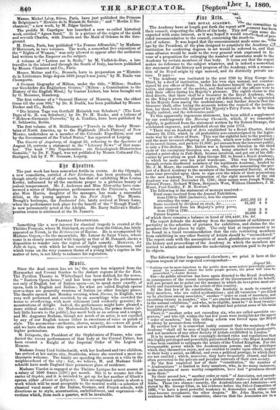Muir.
Since the dead season has set in,' the opera has migrated from the Haymarket and Covent Garden to the distant regions of the far East. The Pavilion Theatre in Whitechapel has been dubbed, for the nonce, the "Eastern Opera-house," and has been opened for the performance not only of English but of Italian opera—or, to speak more exactly, of opera, both in English and Italian; for what are called English operas now-a-days are generally versions of Italian (or other foreign) pieces. The theatre opened last Monday evening, when Norma, in English, was very well performed and received, by an assemblage who crowded the house to overflowing, with most vehement (and evidently genuine) de- monstrations of delight. Indeed, the performance might have pleased a more critical audience; for Mademoiselle Lancia, the prima donna (al- beit little known to the public), has merit both as an actress and a singer, and Mr. Augustus &ahem, though not much of an actor, is not excelled by any of our English tenors either in sweetness of voice or polish of style. The accessories—orchestra, chorus, scenery, &c.—were all good; and we have often seen this opera not so well performed in theatres of higher pretensions. M. Delaporte, the President of the Orphionists of France, who con- ducted the recent performances of that body at the Crystal Palace, has been created a 'knight of the Imperial Order of the Legion of Honour.
. Madame Jenny Lind Goldschmidt, with her husband and two children, has arrived at her native city, Stockholm, where she received a most en- thusiastic welcome. The family are spending the season at a villa in the neighbourhood of the city; but, we believe, M. and Madame Gold- schmidt have made England their permanent place of residence. Madame Viardot is engaged at the Theatre Lyrique for next season at a salary of 3000 francs (120/.) per month. She is to resume her cha- racter of Orphee, and it is intended to get up for her another of Gluck's operas, either Alceste or Iphigt:nie. This accomplished artiste is about a work which will be most acceptable to the musical world—a selection of classical vocal music of the Italian, German, and French schools, with directions as to style, accentuation, embellishment, and expression—di- rections which, from such a quarter, will be invaluable.


























 Previous page
Previous page